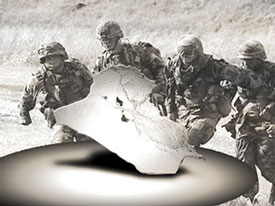Grieving mother’s advice to Bush: ‘Bring our boys home’

(FinalCall.com) – A United Press International (UPI) reporter issued an “exclusive” story on November 14, stating that “the number of U.S. casualties from ‘Operation Iraqi Freedom,’ troops killed, wounded or evacuated due to injury or illness, now stands at 9,200.” The newspaper story said that the Pentagon had released the figures.
The story said that the office of the Army Surgeon General reported that there were 397 service members dead, 1,967 wounded and 6,861 who had been evacuated for non-combat conditions such as vehicle accidents, illness, psychiatric problems, neurological-surgery and dental problems.
The UPI story received wide media attention, even in conservative newspapers such as The Washington Times. However, conservative analysts argued that it was disingenuous to write a headline lumping combat deaths (and serious injuries) with other evacuations caused by root canal or the flu. They said the “liberals” use the “fallacy” of lumping non-related facts together to develop statistics that, “although true, are misleading.”
These same analysts say that reading the UPI story would cause the reader to jump to the conclusion that loss of life and limbs due to combat is a great deal higher than it actually is. A spokeswoman for the Army Surgeon General said the story was mixing apples with oranges.
Steven Robinson, executive director of the National Gulf War Resource Center, told UPI that activists wanted to know what types of “illnesses” people were returning with. He said that his organization did not “want a repeat of the first Gulf War” medical issues that now plague many vets who fought in the 1991 war.
While the UPI story was breaking, reporters were being huddled into a roped-off area at Arlington Cemetery, far from gravesite funerals for service members killed in Iraq, according to the Washington Post. The newspaper said that a spokesman for the Army’s Military District of Washington overseers of the cemetery said the orders to place reporters there came from high up in the Pentagon. The spokesperson said the change was sudden.
The Washington Post said that officials have also barred media coverage of the bodies of troops arriving at Dover Air Force Base in Delaware. The Army issued a statement that orders at both facilities relating to the press was covered by rules that had been long ignored.
“The change comes as the White House and the Pentagon are showing increased sensitivity to the portrayal of U.S. casualties from the war in Iraq,” the story said.
But the Army was not only coming under scrutiny from the press. On Capitol Hill, the Senate Armed Services Committee held a hearing to discuss the conditions on American bases facing soldiers who were returning from Iraq with medical needs. Hawaii’s Democratic Senator Daniel Akaka asked acting Army Secretary Les Brownlee what was being done to insure that a repeat of the “horrible conditions” uncovered in Fort Stewart located in Georgia, would not re-occur.
In a story released in October, UPI said that more than 600 soldiers waited weeks, and sometimes months, for medical care at Fort Stewart. The wire service said that some soldiers were kept in concrete barracks with no running water and no air conditioning.
The Army said that a new standard had been established that sick and injured soldiers must be in clean housing with climate control and running water. It was also stated by the Army that they were giving soldiers access to civilian doctors, and that more military medical staff was being mustered. The army also warned of a “shortage” of doctors and housing facing the thousands of troops who will return from Iraq in the year 2004.












